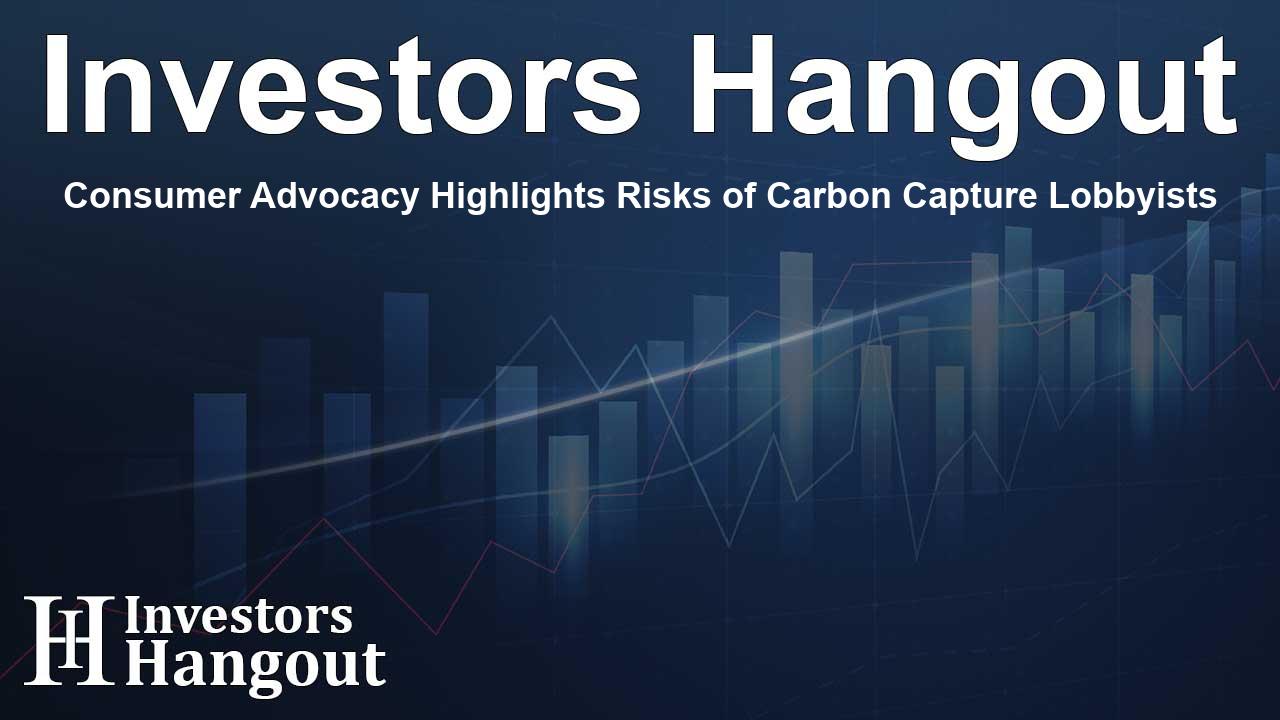Consumer Advocacy Highlights Risks of Carbon Capture Lobbyists

Consumer Watchdog Questions Carbon Capture Lobbying in Legislation
As legislative discussions about extending Cap-and-Trade to 2045 intensify, Consumer Watchdog is urging lawmakers to resist the influence of lobbyists advocating for Carbon Capture and Storage (CCS). This advocacy comes against the backdrop of the state’s critical greenhouse gas reduction strategies, which include capping emissions and allowing companies to trade pollution allowances. Consumer Watchdog emphasizes that integrating CCS into Cap-and-Trade could undermine the effectiveness of the program.
Concerns Over Lobbyist Motivations
In a recent letter addressed to key legislative figures, Consumer Watchdog expressed concern about the involvement of former regulators who have become lobbyists, asserting that they prioritize personal gain over public interest. These lobbyists, many of whom have connections to major oil companies, promote CCS as a favorable solution to climate concerns, despite evidence suggesting that it is environmentally harmful and less reliable than alternative strategies.
The Challenge of CCS
Carbon Capture and Storage is often presented as a technology with the potential to mitigate emissions; however, Consumer Watchdog argues that the process is not only polluting but also highly energy-intensive. They point out that before this technology can be deemed effective, it must overcome significant hurdles, including technological failures and environmental risks associated with transporting compressed carbon.
Critique of Industry Investments
The letter highlights that CCS proponents wish for the California Air Resources Board (CARB) to affirm that CCS can reduce the number of pollution allowances required from oil companies. This would enable these companies to benefit from carbon offset credits derived from external CCS investments, a practice that Consumer Watchdog argues will not substantively address local pollution issues. Instead, ongoing projects such as reforestation and landfill methane capture remain more effective means of achieving compliance with Cap-and-Trade without compromising air quality.
The Role of Lobbyists in Shaping Air Policy
Consumer Watchdog draws attention to lobbyists like Virgil Welch, who has switched between roles at CARB and private consulting firms. His experience exemplifies how policymakers can leverage regulatory insight to benefit corporate interests. While lobbyists may attempt to cast CCS in a positive light, the reality is that these technologies often fall short of delivering on their promises.
Industry Impact and Consumer Costs
As CARB tightens regulations under the Low Carbon Fuel Standard and Cap-and-Trade programs, increased compliance costs are likely to be passed down to consumers. This situation leads to higher prices for goods and services as companies seek to offset their expenditures related to carbon compliance measures. Consumer Watchdog argues that the public should not bear the financial burden of inadequate regulatory policies that favor industry profits over environmental integrity.
Conclusion: A Call for Fair Legislative Practices
In conclusion, Consumer Watchdog calls on legislators to carefully consider the implications of incorporating CCS into Cap-and-Trade. They contend that allowing this technology to be part of the greenhouse gas reduction strategy would be a disservice to the environment and consumer interests alike. Striving for transparency and fairness in policymaking remains crucial for a genuine shift towards a zero-carbon future that benefits both the planet and its inhabitants. Policymakers must prioritize effective, verifiable solutions over lobbyist-driven agendas.
Frequently Asked Questions
What is the main concern about Carbon Capture and Storage (CCS)?
Consumer Watchdog argues that CCS is largely ineffective and poses environmental risks, including being energy-intensive and the potential for leakage during transportation.
How do lobbyists influence Cap-and-Trade discussions?
Lobbyists often push for policies like CCS to benefit corporate interests, shaping the legislative landscape in their favor rather than prioritizing public health and environmental protection.
What are the alternative solutions suggested by Consumer Watchdog?
Consumer Watchdog promotes initiatives such as reforestation, methane capture, and ensuring that compliance measures directly reduce emissions at points of pollution.
Why are rising compliance costs a concern for consumers?
Increased costs associated with compliance are likely to be passed onto consumers, leading to higher prices for goods and services, creating an unfair financial burden.
What legislative actions does Consumer Watchdog advocate for?
Consumer Watchdog urges lawmakers to reject including CCS in Cap-and-Trade and to focus on solutions that genuinely contribute to reducing carbon emissions without compromising air quality.
About The Author
Contact Dylan Bailey privately here. Or send an email with ATTN: Dylan Bailey as the subject to contact@investorshangout.com.
About Investors Hangout
Investors Hangout is a leading online stock forum for financial discussion and learning, offering a wide range of free tools and resources. It draws in traders of all levels, who exchange market knowledge, investigate trading tactics, and keep an eye on industry developments in real time. Featuring financial articles, stock message boards, quotes, charts, company profiles, and live news updates. Through cooperative learning and a wealth of informational resources, it helps users from novices creating their first portfolios to experts honing their techniques. Join Investors Hangout today: https://investorshangout.com/
The content of this article is based on factual, publicly available information and does not represent legal, financial, or investment advice. Investors Hangout does not offer financial advice, and the author is not a licensed financial advisor. Consult a qualified advisor before making any financial or investment decisions based on this article. This article should not be considered advice to purchase, sell, or hold any securities or other investments. If any of the material provided here is inaccurate, please contact us for corrections.
